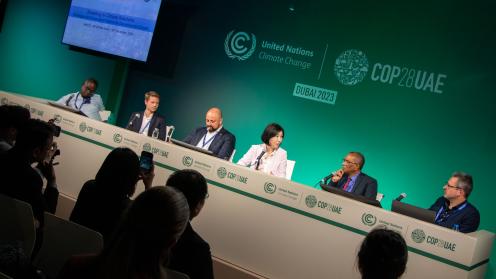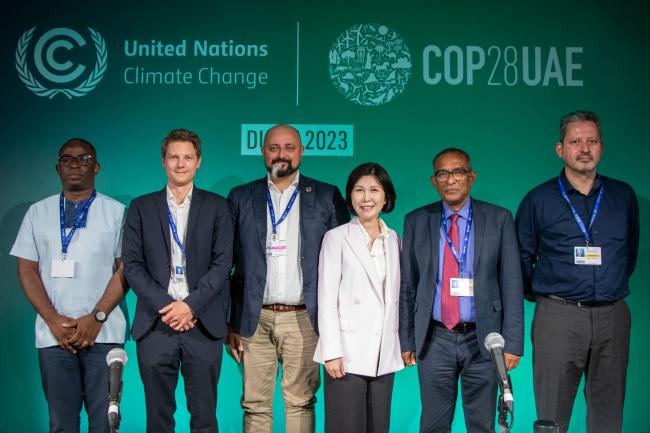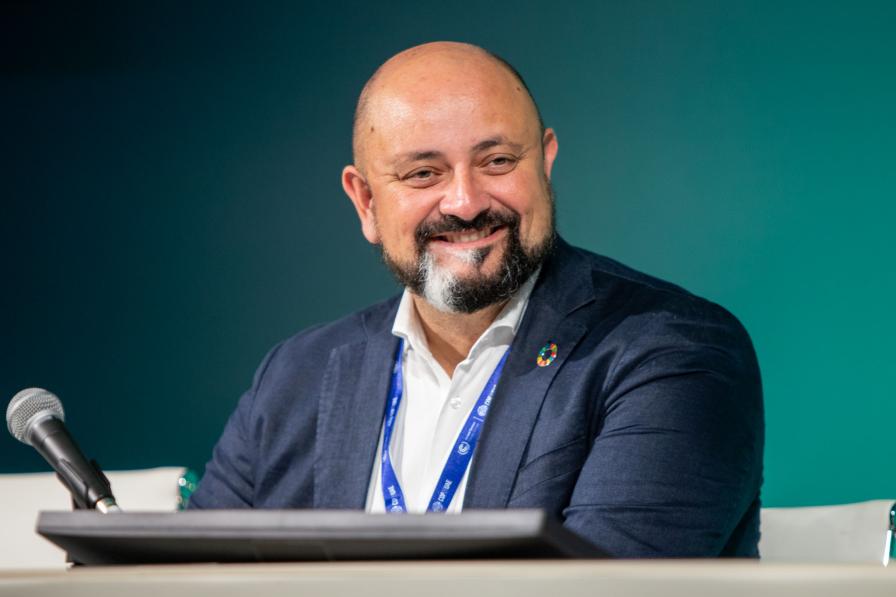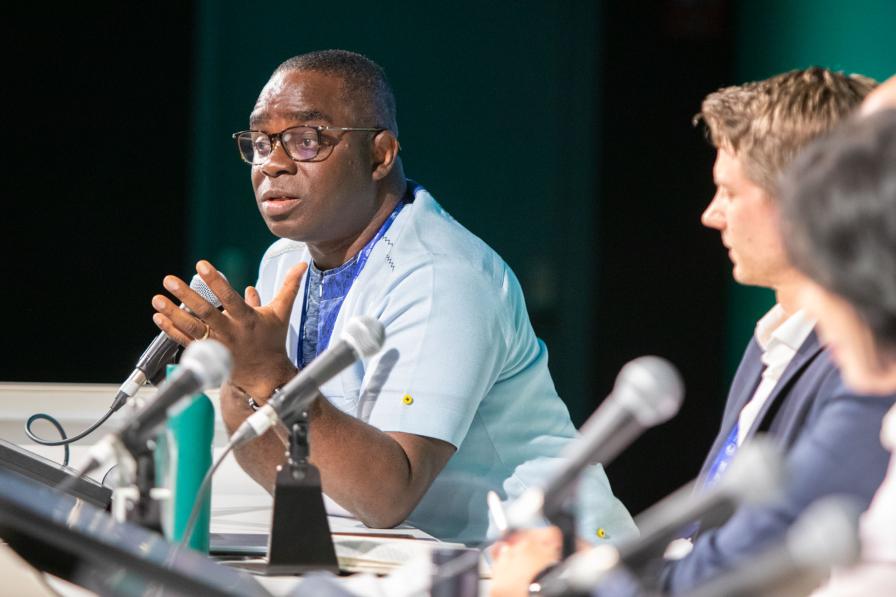About
Panelists discussed the role of financial institutions and investors in driving climate action, as well as how innovative financial solutions like carbon pricing systems can accelerate the adoption of low-carbon technologies.
Investing in Climate Solutions: Strategies and Innovative Finance for Decarbonized Growth
Article 6 of the Paris Agreement is viewed as a key mechanism for developing pathways to decarbonization through the reduction of greenhouse gas (GHG) emissions. This event, organized by Delta Electronics Foundation (DEF), in partnership with the Federation of Indian Chambers of Commerce & Industry (FICCI) and the German Emissions Trading Association (BVEK), discussed the role of financial institutions and investors in driving climate action, as well as how innovative financial solutions like carbon pricing systems can accelerate the adoption of low-carbon technologies.
Vikram Kotru, FICCI, opened the event by discussing the role of financial institutions and investors in driving climate action. He said that innovative financial solutions are needed to accelerate green energy projects that support low carbon technologies, alongside the need for robust market mechanisms under Article 6 that can help reduce the cost of decarbonization and foster sustainable growth. Rambabu Paravastu, Greenko Group, provided further opening remarks, emphasizing the need to accelerate investments in a low carbon future and the key role carbon markets can play. He noted the importance of other mechanisms, such as green bonds, debt and equity structures, and green commodity markets that can also support decarbonization, but he stressed that significant investments are required by industry to support these.
The first panel, moderated by Robert Tippmann, Chairman, BVEK, highlighted the work organizations are doing to support carbon markets and pricing. Shan Shan Guo, Vice Chairperson of the Delta Electronics Foundation, underscored the importance of carbon pricing to enhance broader decarbonization efforts. She discussed different types of internal carbon pricing (ICP) mechanisms and focused on Delta’s carbon fee system that sets a much higher price for carbon compared to other major carbon pricing mechanisms. She argued that this shows Delta’s commitment to aligning with carbon prices outlined in the Intergovernmental Panel on Climate Change’s Sixth Assessment Report. These fees are, in turn, invested into a global carbon fund that supports research and development and energy savings projects to accelerate the net zero target. She emphasized that Delta provides an example of how economic growth can be decoupled from GHG emissions, supporting the notion that growth does not have to negatively impact the environment. She concluded by highlighting Delta’s Introduction of Internal Carbon Pricing: Methods and Applications report as a tool to support others in pricing carbon and zeroing out emissions.
Pietro Bertazzi, CDP, showcased the work his organization did in 2023 to support over 23,000 companies in providing environmental disclosures. He said that company disclosures help accelerate climate action by providing sound data to financial institutions to support effective decision-making. He discussed the importance of leveraging markets to encourage companies to change their behaviors toward more sustainable practices, as well as the correlation between carbon markets and climate action, arguing that “ICP is one of the elements that creates climate action.”
Simon Henry, International Emissions Trading Association (IETA), underscored the role of Article 6 as a “key enabler” driving greater climate ambition, emphasizing that carbon markets are “vital” to supporting the private sector in addressing climate change. He discussed how carbon markets can be an efficient way of deploying capital based on where least cost abatement opportunities are found, as well as the ways in which carbon markets can contribute to supporting NDCs.
Daniel Tutu Benefoe, Director, Environmental Protection Agency, Ghana, noted how the adoption of the Paris Agreement marked a “critical point” for governments to take concrete action to support commitments to achieve net-zero by 2050. He highlighted Ghana’s “ambitious” commitment to supporting Article 6 by way of a national policy on carbon credits, implementing institutional arrangements for carbon products, and enabling the private sector to participate in domestic and international carbon price markets. He noted, however, the economic challenges governments are facing since the COVID-19 pandemic and the difficulties of mobilizing investments in a shrinking fiscal space.
The second panel, moderated by Paravastu, delved further into the specifics of Article 6. Shan discussed challenges associated with addressing Scope 3 GHG emissions, defined as indirect emissions stemming from global value chains, noting their significant contribution to emissions. She said Delta is planning to expand their efforts to support decarbonization under Scope 3 through the identification and prioritization of specific sectors and products.
Bertazzi lauded the progress made by over 60% of companies using CDP’s platform to disclose Scope 1 direct emissions and Scope 2 emissions from purchased energy in 2023, but the low rate of Scope 3 disclosures at 42%. He stressed the need for financial institutions to request this kind of data as a way to nudge companies to support Scope 3 disclosures. He reiterated the work his organization is doing to engage with policy makers to support a transition from voluntary to regulated carbon markets, noting that “this transition is inevitable,” given the urgent need to support climate action.
Henry said that delays in Article 6.4 negotiations to implement a global mechanism for carbon pricing are impacting levels of investment. He noted progress being made through bilateral cooperation under Article 6.2, but that this is a “diplomatically intense process,” and that the implementation of Article 6.4 will speed up action. He also discussed innovations in the European Union’s Emissions Trading System (EU-ETS), noting that a new market, EU-ETS2, will be launched to increase the scope of carbon pricing in the EU.
Benefoe urged pushing for a structurally strong Article 6.4 because this mechanism will play an important role in supporting those working under Article 6.2. He said that if we want to increase ambition, we need to effectively unlock finance from the private sector.
The event closed with a Q&A session that focused on: certifications and credits for nuclear energy; sectoral leakages in carbon pricing; and the need for alignment between different carbon pricing mechanisms.
Organizer: Delta Electronics Foundation
Contact: Johnny Shih - Johnny.Shih@deltaww.com
For more information: https://www.delta-foundation.org.tw/en
To receive free coverage of global environmental events delivered to your inbox, subscribe to the ENB Update newsletter.
All ENB photos are free to use with attribution. For this COP 28 side event, please use: Photo by IISD/ENB | Matthew TenBruggencate.



















